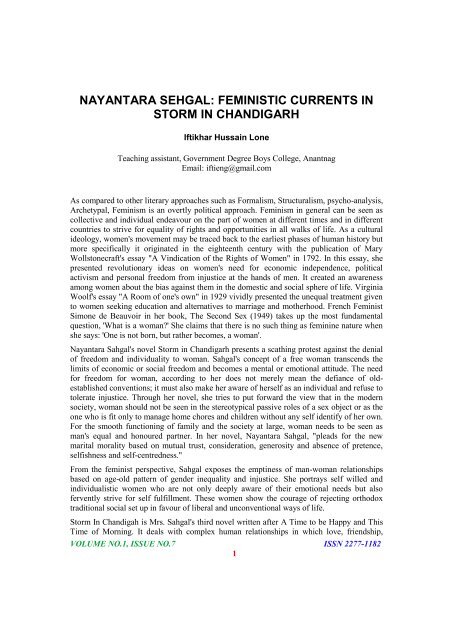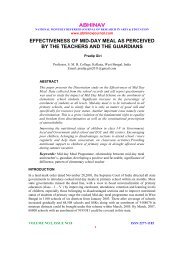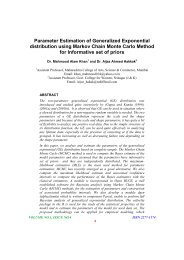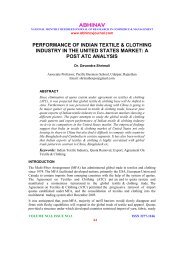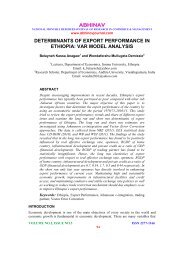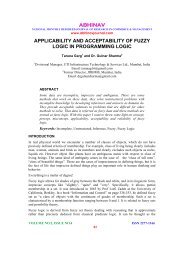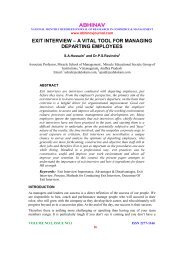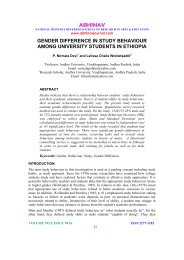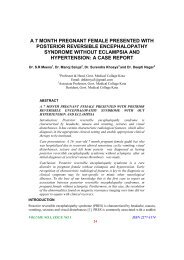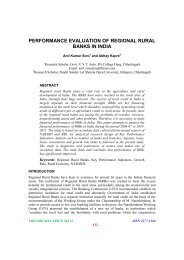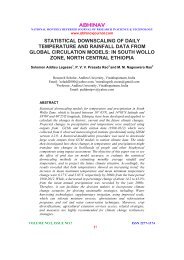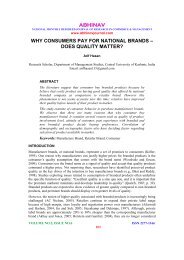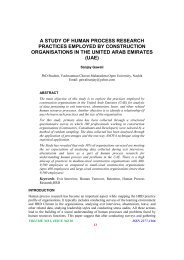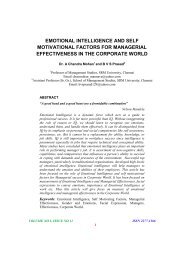Nayantara Sehgal: Feministic Currents in Storm in Chandigarh
Nayantara Sehgal: Feministic Currents in Storm in Chandigarh
Nayantara Sehgal: Feministic Currents in Storm in Chandigarh
Create successful ePaper yourself
Turn your PDF publications into a flip-book with our unique Google optimized e-Paper software.
NAYANTARA SEHGAL: FEMINISTIC CURRENTS IN<br />
STORM IN CHANDIGARH<br />
Iftikhar Hussa<strong>in</strong> Lone<br />
Teach<strong>in</strong>g assistant, Government Degree Boys College, Anantnag<br />
Email: iftieng@gmail.com<br />
As compared to other literary approaches such as Formalism, Structuralism, psycho-analysis,<br />
Archetypal, Fem<strong>in</strong>ism is an overtly political approach. Fem<strong>in</strong>ism <strong>in</strong> general can be seen as<br />
collective and <strong>in</strong>dividual endeavour on the part of women at different times and <strong>in</strong> different<br />
countries to strive for equality of rights and opportunities <strong>in</strong> all walks of life. As a cultural<br />
ideology, women's movement may be traced back to the earliest phases of human history but<br />
more specifically it orig<strong>in</strong>ated <strong>in</strong> the eighteenth century with the publication of Mary<br />
Wollstonecraft's essay "A V<strong>in</strong>dication of the Rights of Women" <strong>in</strong> 1792. In this essay, she<br />
presented revolutionary ideas on women's need for economic <strong>in</strong>dependence, political<br />
activism and personal freedom from <strong>in</strong>justice at the hands of men. It created an awareness<br />
among women about the bias aga<strong>in</strong>st them <strong>in</strong> the domestic and social sphere of life. Virg<strong>in</strong>ia<br />
Woolf's essay "A Room of one's own" <strong>in</strong> 1929 vividly presented the unequal treatment given<br />
to women seek<strong>in</strong>g education and alternatives to marriage and motherhood. French Fem<strong>in</strong>ist<br />
Simone de Beauvoir <strong>in</strong> her book, The Second Sex (1949) takes up the most fundamental<br />
question, 'What is a woman' She claims that there is no such th<strong>in</strong>g as fem<strong>in</strong><strong>in</strong>e nature when<br />
she says: 'One is not born, but rather becomes, a woman'.<br />
<strong>Nayantara</strong> Sahgal's novel <strong>Storm</strong> <strong>in</strong> <strong>Chandigarh</strong> presents a scath<strong>in</strong>g protest aga<strong>in</strong>st the denial<br />
of freedom and <strong>in</strong>dividuality to woman. Sahgal's concept of a free woman transcends the<br />
limits of economic or social freedom and becomes a mental or emotional attitude. The need<br />
for freedom for woman, accord<strong>in</strong>g to her does not merely mean the defiance of oldestablished<br />
conventions; it must also make her aware of herself as an <strong>in</strong>dividual and refuse to<br />
tolerate <strong>in</strong>justice. Through her novel, she tries to put forward the view that <strong>in</strong> the modern<br />
society, woman should not be seen <strong>in</strong> the stereotypical passive roles of a sex object or as the<br />
one who is fit only to manage home chores and children without any self identify of her own.<br />
For the smooth function<strong>in</strong>g of family and the society at large, woman needs to be seen as<br />
man's equal and honoured partner. In her novel, <strong>Nayantara</strong> Sahgal, "pleads for the new<br />
marital morality based on mutual trust, consideration, generosity and absence of pretence,<br />
selfishness and self-centredness."<br />
From the fem<strong>in</strong>ist perspective, Sahgal exposes the empt<strong>in</strong>ess of man-woman relationships<br />
based on age-old pattern of gender <strong>in</strong>equality and <strong>in</strong>justice. She portrays self willed and<br />
<strong>in</strong>dividualistic women who are not only deeply aware of their emotional needs but also<br />
fervently strive for self fulfillment. These women show the courage of reject<strong>in</strong>g orthodox<br />
traditional social set up <strong>in</strong> favour of liberal and unconventional ways of life.<br />
<strong>Storm</strong> In Chandigah is Mrs. Sahgal's third novel written after A Time to be Happy and This<br />
Time of Morn<strong>in</strong>g. It deals with complex human relationships <strong>in</strong> which love, friendship,<br />
VOLUME NO.1, ISSUE NO.7 ISSN 2277-1182<br />
1
ABHINAV<br />
NATIONAL MONTHLY REFEREED JOURNAL OF REASEARCH IN ARTS & EDUCATION<br />
www.abh<strong>in</strong>avjournal.com<br />
honesty, freedom and equality play a vital role. The 'storm' <strong>in</strong> the lives of three married<br />
couples, Inder and Saroj, Jit and Mara and Vishal and Leela is portrayed aga<strong>in</strong>st the political<br />
backdrop of storm' or confrontation between the newly divided states of the Punjab and<br />
Haryana over the issues of <strong>Chandigarh</strong> and, Bakhra Nangal territory etc. Gyan S<strong>in</strong>gh, the<br />
ambitious Chief M<strong>in</strong>ister of Punjab has announced a strike <strong>in</strong> the whole region for the selfish<br />
purpose of demonstrat<strong>in</strong>g his political strength. He is only concerned with his personal ga<strong>in</strong>s<br />
and does not even hesitate to use violence as a means for achiev<strong>in</strong>g his selfish ends. While<br />
Harpal S<strong>in</strong>gh, the Chief M<strong>in</strong>ister of Haryana acts as political counterfoil to Gyar, S<strong>in</strong>gh as he<br />
is a believer <strong>in</strong> the Gandhian ideology of non-violence. He has always given priority to the<br />
<strong>in</strong>terests of people aga<strong>in</strong>st his self <strong>in</strong>terest. The Union Home M<strong>in</strong>ister assigns the task of<br />
effect<strong>in</strong>g a rapproachment between the two warr<strong>in</strong>g states to Vishal Dubey, an honest and<br />
promis<strong>in</strong>g central officer. Dubey goes to <strong>Chandigarh</strong> from Delhi to solve the political<br />
impasse but unwitt<strong>in</strong>gly <strong>in</strong>volves himself <strong>in</strong> the private lives of the estranged husbands and<br />
wives especially those of Saroj and Inder.<br />
Saroj, the female protagonist <strong>in</strong> the novel is married to Inder who runs the textile mills of<br />
Saroj's cous<strong>in</strong> Nikhil Ray's company <strong>in</strong> <strong>Chandigarh</strong>. There is no emotional communion<br />
between Saroj and Inder <strong>in</strong>spite of the fact that they have been married for the last four years<br />
and have two children. In the novel, Saroj emerges as a victim of male tyranny and<br />
chauv<strong>in</strong>ism. She fears rather than loves her husband. She represents the new woman who is<br />
try<strong>in</strong>g to reta<strong>in</strong> her <strong>in</strong>dividuality and breathe freely <strong>in</strong> the suffocat<strong>in</strong>g atmosphere of<br />
passionless and emotionally unfulfill<strong>in</strong>g marriages. "The New Woman is determ<strong>in</strong>ed not<br />
merely to live, but to live <strong>in</strong> self respect, thus implicitly demand<strong>in</strong>g a re-alignment of the<br />
parameters on which marriage function. Marriage without emotional <strong>in</strong>volvement, sex<br />
without passion, love without respect are anathema to her as she manoeuvres her way<br />
through the chang<strong>in</strong>g times.<br />
Saroj had a physical relationship with a person before her marriage but she does not consider<br />
it as a s<strong>in</strong> rather as a part of grow<strong>in</strong>g up. After her marriage she has been faithful to Inder to<br />
the fullest degree. She is a person who values mutual trust, consideration, honesty,<br />
communication and absence of pretence <strong>in</strong> a relationship. "Hail<strong>in</strong>g from a liberal family,<br />
believ<strong>in</strong>g <strong>in</strong> openness and trust as the hallmark of relationships, Saroj had naively presumed<br />
that her husband shared those values, not realiz<strong>in</strong>g that he was the product of an atmosphere<br />
where male dom<strong>in</strong>ance is the most formidable Of cults." 4 She is thoroughly truthful to Inder<br />
and her honesty <strong>in</strong> marital relationship can be gauged from the fact that she even confesses<br />
about her pre-marital relationship to him with the <strong>in</strong>tention of look<strong>in</strong>g forward to a clean<br />
break from the past. But this confession actually dooms their marriage. Inder "was maddened<br />
by it. When it came over him he sat look<strong>in</strong>g at Saroj with a revulsion that had ancient, tribal,<br />
male roots. ,5 (96). Inder represents the traditional patriarchal attitude of society toward<br />
woman which puts high premium on female chastity and virg<strong>in</strong>ity before marriage. While <strong>in</strong><br />
the same patriarchal set up, the idea of male chastity <strong>in</strong> never thought about, let alone<br />
questioned. The double standards of patriarchal morality is visible from the fact that Inder<br />
who wants to make Saroj feel 'ashamed' of her pre-marital affair himself has many sexual<br />
experiences before marriage as the third person narrator tells, "he had been precocious and<br />
successful <strong>in</strong> sex, robustly collect<strong>in</strong>g experience where he found it." (134). But women have<br />
no right to question male promiscuity or <strong>in</strong>dulge <strong>in</strong> practices which are considered to be male<br />
prerogatives. This patriarchal attitude is aptly summed up by Dubey when he says, "The one<br />
VOLUME NO.1, ISSUE NO.7 ISSN 2277-1182<br />
2
ABHINAV<br />
NATIONAL MONTHLY REFEREED JOURNAL OF REASEARCH IN ARTS & EDUCATION<br />
www.abh<strong>in</strong>avjournal.com<br />
th<strong>in</strong>g you could not crave, the th<strong>in</strong>g that was a crime was that they should <strong>in</strong>habit the world<br />
as your equals, with splendor and variety of human choice before them."(190). Men like<br />
Inder who are the products of conventional orthodox patriarchal society and whose<br />
consciousness is steeped <strong>in</strong> male chauv<strong>in</strong>ism can never accept non-virg<strong>in</strong> women as wives.<br />
Inder felt deeply cheated as he recalls, "Somewhere he had read the were primitive societies<br />
that demanded the blood of virg<strong>in</strong>ity as there were evidence of female purity. No man need<br />
be cheated of that. He had been cheated."(96). Human civilization, irrespective of time and<br />
space has always demanded that a woman should be pure and virg<strong>in</strong> before marriage. In the<br />
ancient times, even the most virtuous woman like Sita had to go through the test of purity<br />
after she was abducted by Ravan, <strong>in</strong> order to return to the fold of marriage. In the n<strong>in</strong>eteenth<br />
century, Angel Clare of Hardy's Tess of D'urbervilles who was deeply <strong>in</strong> love with Tess<br />
leaves her when he comes to know that her virg<strong>in</strong>ity was ravished by another man before<br />
their marriage. And <strong>in</strong> the post <strong>in</strong>dependent India, there has been no change <strong>in</strong> this age old<br />
trend. This shows that <strong>in</strong>spite of technological development, ideologically human race has<br />
progressed very little. Vishal Dubey, who emerges as the spokesperson of the novelist,<br />
rightly sums up patriarchal prejudice aga<strong>in</strong>st woman when he says, "A woman was not<br />
entitled to a past, not entitled to human hunger, human passion or even human error. In the<br />
fires and desolations of liv<strong>in</strong>g she ranked as not quite human."(190).<br />
Inder <strong>in</strong>stead of reach<strong>in</strong>g out and valu<strong>in</strong>g the precious human be<strong>in</strong>g <strong>in</strong> Saroj, has never been<br />
able to forget her pre-marital affair and neither let her forget it. He keeps on tortur<strong>in</strong>g her<br />
mentally and physically ever s<strong>in</strong>ce her confession. But as every cloud has silver l<strong>in</strong><strong>in</strong>g,<br />
modern society, <strong>in</strong>spite of its male dom<strong>in</strong>ated ideology, has men like Vishal Dubey who<br />
believe <strong>in</strong> gender equality and women's liberation His views on female chastity are like whiff<br />
of fresh air <strong>in</strong> suffocat<strong>in</strong>g patriarchal atmosphere as he says, "If chastity is so important and<br />
so well worth preserv<strong>in</strong>g... it would be easier to safeguard it by keep<strong>in</strong>g men <strong>in</strong> seclusion,<br />
not women... The biological urge is supposed to be much stronger <strong>in</strong> men, so it is they who<br />
should be kept under restra<strong>in</strong>t and not allowed to roam free to <strong>in</strong>dulge their appetites. The<br />
entire east might. Flourish under this sort of reversal of purdah. "(191).<br />
Saroj symbolizes modern women who want to establish a new order with changed standards<br />
where they can be their true selves and where character is judged by the purity of heart and<br />
not chastity of body. "Accord<strong>in</strong>g to Sahgal, Saroj's premarital act of sex has noth<strong>in</strong>g to do<br />
with the pollution of flesh, promiscuity or immorality. , 6 But Inder's attitude towards her has<br />
always been of disgust, contempt and revulsion. He always abuses her and sometimes even<br />
brutally beats here because of her this one act before marriage. On the other hand, <strong>in</strong>spite of<br />
all this torture and tormentation, Saroj has never let her <strong>in</strong>ner strength, her pride and her self<br />
esteem get completely obliterated. "Even <strong>in</strong> extremity, she had never said, 'Forgive me'. For<br />
each time she had lived through a night's torment, she could wake to the sunlight and f<strong>in</strong>d<br />
herself unsullied <strong>in</strong> it."(94). Saroj tries her level best to adjust and compromise at every po<strong>in</strong>t<br />
with Inder because she feels that she is responsible for the failure of their marriage. She<br />
always rema<strong>in</strong> vigilant not to do th<strong>in</strong>gs which could annoy Inder and tries to talk on 'safe'<br />
topics which could not make him burst <strong>in</strong>to anger. Because of such conscious liv<strong>in</strong>g with<br />
Inder where there is no room for spontaneous behavior, she always feel tense and<br />
pressurized. Her mental burden is evident when she frankly tells Vishal, "Half the time one is<br />
afraid – you know – say<strong>in</strong>g the wrong th<strong>in</strong>g or of be<strong>in</strong>g misunderstood- just for be<strong>in</strong>g oneself<br />
and be<strong>in</strong>g punished for it. So one spends such a lot of time act<strong>in</strong>g or at least hid<strong>in</strong>g and that's<br />
VOLUME NO.1, ISSUE NO.7 ISSN 2277-1182<br />
3
ABHINAV<br />
NATIONAL MONTHLY REFEREED JOURNAL OF REASEARCH IN ARTS & EDUCATION<br />
www.abh<strong>in</strong>avjournal.com<br />
very tir<strong>in</strong>g." (89).<br />
There is no passionate bond, affection, emotional communication or understand<strong>in</strong>g between<br />
Saroj and Inder. He treats her with total <strong>in</strong>difference and regards her only as a sex object.<br />
When he comes to know that Saroj is pregnant <strong>in</strong>spite of their already hav<strong>in</strong>g two children,<br />
he felt irritated and rebukes her as if only she is responsible for her pregnancy. He puts the<br />
whole blame on her when he says, "Hundreds of women use the damned th<strong>in</strong>g successfully<br />
its madness to have three children nowadays." (46).<br />
After her pregnancy, when Saroj first feels the flutter <strong>in</strong>side her body, she is overjoyed and<br />
wants Inder to feel it move but for Inder "the touch without sexual significance, the caress of<br />
affection was different. It cost him an effort to make it." (175). While sex with her came to<br />
him without any effort and difficulty and it was a mere performance of act without any<br />
emotional <strong>in</strong>volvement for him.<br />
Saroj is a person who is fully <strong>in</strong>volved <strong>in</strong> life. She wants to feel the every moment of her<br />
pregnancy. When she first feels the flutter <strong>in</strong>sider her body, she wants to laugh and celebrate.<br />
She even tells Vishal that her flutter is n<strong>in</strong>e <strong>in</strong>ches long. For her, to have babies without<br />
be<strong>in</strong>g completely <strong>in</strong>volved <strong>in</strong> the process is same as dogs and cats have their babies.<br />
Accord<strong>in</strong>g to her, by feel<strong>in</strong>g the every step of the process, one is not troubled by the pa<strong>in</strong><br />
rather one feels dignified. Saroj is a woman who is <strong>in</strong>terested only <strong>in</strong> liv<strong>in</strong>g th<strong>in</strong>gs around<br />
her. She is not at all bothered about the untidy th<strong>in</strong>gs <strong>in</strong> her house, for example, she does not<br />
m<strong>in</strong>d if sofas and chairs <strong>in</strong> her house need to be upholstered or if children's socks need<br />
darn<strong>in</strong>g. The th<strong>in</strong>gs, which are not alive, are not important for her. On the other hand, she is<br />
very careful that her garden looks beautiful and orderly. She takes <strong>in</strong>f<strong>in</strong>ite pa<strong>in</strong>s with a stray<br />
animal and spends hours <strong>in</strong> the company of her children. But Inder is unable to reach to the<br />
deep core of her <strong>in</strong>ner be<strong>in</strong>g. He feels irritated at her slip-shod house-keep<strong>in</strong>g, at her careless<br />
way of dress<strong>in</strong>g and at her wonder at every flutter <strong>in</strong> her body. He never th<strong>in</strong>ks of her as a<br />
person with feel<strong>in</strong>gs and emotions and is therefore, unable to comprehend her need to be<br />
deeply <strong>in</strong>volved <strong>in</strong> th<strong>in</strong>gs happen<strong>in</strong>g around her. He is a bus<strong>in</strong>essman and th<strong>in</strong>ks of his wife<br />
also <strong>in</strong> bus<strong>in</strong>ess like terms. For him, "A wife was one half of an enterprise, the compliant<br />
bus<strong>in</strong>ess partner who presided over house and children and furthered her husband's career.<br />
Saroj had not <strong>in</strong>terest <strong>in</strong> any of it and not because she was gifted with any accomplishment<br />
that took her time.<br />
It was her pre-occupation with herself that unnerved him. That and curious concentration of<br />
her spirit upon whatever came her way." (53). This makes evident that Inder allows no<br />
<strong>in</strong>dividuality and freedom to Saroj. Inder <strong>in</strong> this sense behaves like a typical representative of<br />
patriarchal society <strong>in</strong> which, as Julia Kristeva po<strong>in</strong>ts out, woman is always marg<strong>in</strong>alized by<br />
the male symbolic order. He wants to control all her actions and wants her thoughts to be <strong>in</strong><br />
agreement with him. When Saroj f<strong>in</strong>ds a good friend <strong>in</strong> the form of Vishal Dubey and<br />
frequently goes for walk with him, Inder gets deeply <strong>in</strong>furiated. He snubs her for be<strong>in</strong>g<br />
absent from home. Sarofs utterance- "I like to talk to him. He is a good man"- <strong>in</strong>flames Inder<br />
and he blunts, "I don't give a damn if he is Jesus Christ."(193). So say<strong>in</strong>g he thrashes her not<br />
only with words but also with blows. "This attitude of Inder, it will be agreed, is typical of<br />
Indian men, who regard their wives to be possessions, meant to be used for further<strong>in</strong>g their<br />
careers and look<strong>in</strong>g after their homes and children. That this is the approved norm is proved<br />
by the wife's passive acceptance of the whole situation. ,7 Saroj's martial relationship with<br />
VOLUME NO.1, ISSUE NO.7 ISSN 2277-1182<br />
4
ABHINAV<br />
NATIONAL MONTHLY REFEREED JOURNAL OF REASEARCH IN ARTS & EDUCATION<br />
www.abh<strong>in</strong>avjournal.com<br />
Inder is completely contrary to her image of ideal marriage where "it would recognize that<br />
somewhere with<strong>in</strong> the desirable woman, beh<strong>in</strong>d the eyes, the mouth, the breasts, there was a<br />
-struggl<strong>in</strong>g, imperfect human be<strong>in</strong>g to be valued for her own sake."(192).<br />
Saroj's yearn<strong>in</strong>g for acceptance, communication, honesty, liberty and lack of pretence <strong>in</strong> a<br />
relationship draws her near Vishal Dubey who completely shares her emotional crav<strong>in</strong>gs. He<br />
like Saroj is also a victim of marital unhapp<strong>in</strong>ess. His wife, Leela who dies six years back<br />
due to the surgery of an <strong>in</strong>competent abortionist, has never been able to reach the <strong>in</strong>ner core<br />
of his personality. She marries Dubey because he is a successful civil servant with promis<strong>in</strong>g<br />
future. The mismatch between the two is evident from the fact that Leela was used to the life<br />
of social parties, hypocrisy, adultery and pretence while Vishal wanted a person with whom<br />
one can "talk to when the day's work was done, the friend with whom one could be naked <strong>in</strong><br />
spirit and to whom one could give the whole of oneself."(69). His loveless and faithless wife<br />
is not able to fulfill his need for companionship and understand<strong>in</strong>g. Vishal and Saroj's<br />
common ideas about marital relationship which accord<strong>in</strong>g to them should be based on<br />
emotional communication, honesty, complete acceptance of other person's weaknesses and<br />
lack of pretence and their lack of realization of such relationship with their respective<br />
spouses br<strong>in</strong>g them close to each other.<br />
Vishal Dubey is a fem<strong>in</strong>ist <strong>in</strong> the real sense of the term. As Toril Moi says <strong>in</strong> his essay,<br />
'Fem<strong>in</strong>ist Literary Criticism' that men can be fem<strong>in</strong>ists and, it is the sole prerogative of<br />
woman to be a fem<strong>in</strong>ist. Most of Dubey's ideas <strong>in</strong> the novel shows his deep concern about<br />
the lot of women <strong>in</strong> present times. "He thought of his own country women as the subdued<br />
sex, creatures not yet emerged from the chrysalis, for whom the adventure of self-expression<br />
had not even begun... there had long been a figure of humility, neck bent, eyes downcast,<br />
liv<strong>in</strong>g flesh consigned to oblivion... Their sphere was sexual and their job procreation."<br />
(189). He wants people to th<strong>in</strong>k that the world consists of human be<strong>in</strong>gs rather than men and<br />
women <strong>in</strong> watertight compartments. He has always treated his wife as his equal and has<br />
wanted her to give him her natural self but unfortunately she always ma<strong>in</strong>ta<strong>in</strong>ed her fiction<br />
and proves to be an adulterous lady. With Saroj also, he wants to have a relationship <strong>in</strong><br />
which there is no pretence but frank communication. He loves Saroj not because she is a<br />
woman <strong>in</strong> the physical sense of the term but because he likes the beautiful human be<strong>in</strong>g <strong>in</strong><br />
her.<br />
Mara is childless and runs a school for small children to fill her emotional lack. In the <strong>in</strong>itial<br />
period of their affair, both Inder and Mara experience fulfillment and happ<strong>in</strong>ess. For the first<br />
time, Inder realizes that love does not just mean sex rather it means <strong>in</strong>volvement. His<br />
misconception of Saroj be<strong>in</strong>g impure, has never let him experience a sense of emotional<br />
<strong>in</strong>volvement with her while mak<strong>in</strong>g love to her but his brief affair with Mara fills him with<br />
new revelation about love. He tells Mara, "Do you know the strangest th<strong>in</strong>g about you,<br />
Tamara Talk<strong>in</strong>g to you and kiss<strong>in</strong>g you are all the same. It all blends. I don't know where<br />
one leaves off and the other beg<strong>in</strong>s... Suddenly all the difference between lov<strong>in</strong>g and not<br />
lov<strong>in</strong>g had become apparent to him." (173). On the other hand, Mara <strong>in</strong>spite of hav<strong>in</strong>g lov<strong>in</strong>g<br />
and considerate husband <strong>in</strong> the be<strong>in</strong>g of Jit, gets drifted towards Inder because she wanted,<br />
best of both the worlds- 'the hardness of Inder and softness of Jit. But Mara who has been<br />
brought up <strong>in</strong> the comparatively free environment of Europe has fully developed<br />
<strong>in</strong>dividuality of her own She cannot tolerate that woman should be regarded as an object of<br />
VOLUME NO.1, ISSUE NO.7 ISSN 2277-1182<br />
5
ABHINAV<br />
NATIONAL MONTHLY REFEREED JOURNAL OF REASEARCH IN ARTS & EDUCATION<br />
www.abh<strong>in</strong>avjournal.com<br />
possession. When Inder says about his wife, "She belong to me." Mara quips, "Belongs to<br />
you So do your shoes." (138). Which means that it is not 'belong<strong>in</strong>g' but understand<strong>in</strong>g that<br />
she expects from her man. Time and aga<strong>in</strong>, Mara shows that she is a woman of <strong>in</strong>dependent<br />
self. On one of the occasion when Inder shows his disguist at woman talk<strong>in</strong>g and behav<strong>in</strong>g.<br />
like men, Mara immediately asserts that it may be because that they have started behav<strong>in</strong>g<br />
more like human be<strong>in</strong>gs and less like possessions.' Their relationship comes to an end when<br />
the understand<strong>in</strong>g dawns on Mara that there is some part of Inder which she could never<br />
fully know <strong>in</strong>spite of her best efforts.<br />
In the end Inder is left alone as Saroj decides to go to Delhi for her conf<strong>in</strong>ement and with the<br />
view of spend<strong>in</strong>g rest of her life with Vishal. Inder himself is responsible for his lonel<strong>in</strong>ess<br />
because it is his own <strong>in</strong>flexible and <strong>in</strong>domitable self which prevented him from establish<strong>in</strong>g<br />
an endur<strong>in</strong>g relationship with Saroj or Mara. It is not as though Saroj wants to throw her life<br />
with Inder away and walk out. On the other hand she makes every effort on her part to make<br />
his marriage with Inder successful. The follow<strong>in</strong>g quote makes clear her feel<strong>in</strong>gs for him. "A<br />
yearn<strong>in</strong>g to reach Inder possessed her, stirr<strong>in</strong>g a desire she recognized as old and unfulfilled.<br />
She wanted to love him <strong>in</strong> unpermitted ways, to make love to his doubts and dreams, to the<br />
private worlds with<strong>in</strong> him that were locked and barred from her."(200). But all her efforts to<br />
go near him rema<strong>in</strong> as useless as of a bird beat<strong>in</strong>g aga<strong>in</strong>st the w<strong>in</strong>dow pane to go <strong>in</strong>side. She<br />
wants to be a good wife but not at the cost of her <strong>in</strong>dividuality. She longs for 'oxygen of<br />
understand<strong>in</strong>g' with Inder which she actually f<strong>in</strong>ds <strong>in</strong> her friendship with Vishal. Her<br />
friendship with Vishal makes her realize the hidden potentialities of her self. She realizes<br />
that she can no longer submit to the <strong>in</strong>justice of the dual morality anti double standard<br />
adopted by Inder. She learns that endurance is no virtue and human relationships cannot be<br />
left to chance. In the end she becomes symbolic of modern women who not only aspire for<br />
freedom, dignity and equality <strong>in</strong> a relationship but who actually has the courage to leave the<br />
rott<strong>in</strong>g relationship <strong>in</strong> favour of one which is full of possibilities without car<strong>in</strong>g about<br />
patriarchal society. Compar<strong>in</strong>g Anita Desai and <strong>Nayantara</strong> Sahgal, K. Meera Bai writes<br />
"Anita Desai's women either succumb or survive the existential problems with<strong>in</strong> the family<br />
fold whereas <strong>Nayantara</strong> Sahgal's women come out of the bond, if need be, to live as free<br />
<strong>in</strong>dividuals."<br />
REFERENCES<br />
1. Barry, Peter. Beg<strong>in</strong>n<strong>in</strong>g theory. Manchester, and New York: Manchester University<br />
Press. 1995.<br />
2. Dhawan, R.K. Indian Women Novelists. New Delhi: Prestige Books. 1991.<br />
3. Guer<strong>in</strong>, Wilfred. L. et. al. A Handbook of Critical Approaches to Literature. New York<br />
and Oxford: Oxford University Press. 2005.<br />
4. Rao, A.V. Krishna. <strong>Nayantara</strong> Sahgal. Madras: M Seshachalam & Co. 1976.<br />
5. Roy, Anuradha. Fem<strong>in</strong>ist Consciousness <strong>in</strong> Indian Women Writers. New Delhi: Prestige<br />
Books. 1999.<br />
6. Sahgal, <strong>Nayantara</strong>. <strong>Storm</strong> <strong>in</strong> <strong>Chandigarh</strong>. Delhi : H<strong>in</strong>d Pocket Books (orig<strong>in</strong>ally<br />
published London : Chatto and W<strong>in</strong>dus. 1969)<br />
7. Gupta, G.S. Balarama. Studies <strong>in</strong> Indian Fiction <strong>in</strong> English. Gulbarga: Jiwe Publications.<br />
1987.<br />
VOLUME NO.1, ISSUE NO.7 ISSN 2277-1182<br />
6


